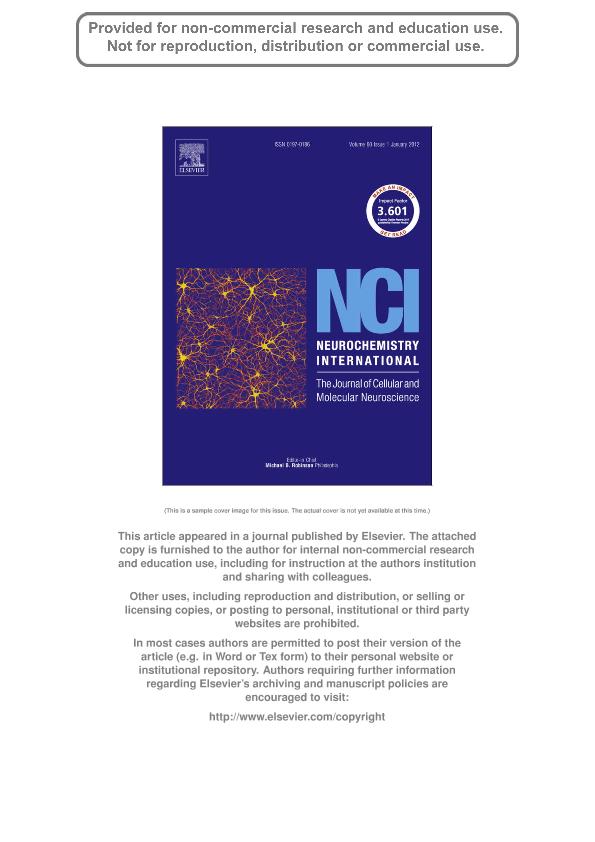Mostrar el registro sencillo del ítem
dc.contributor.author
Schneider, Patricia Graciela

dc.contributor.author
Rodriguez, Georgina Emma

dc.date.available
2017-05-26T18:47:33Z
dc.date.issued
2013-02
dc.identifier.citation
Schneider, Patricia Graciela; Rodriguez, Georgina Emma; Ketamine prevents seizures and reverses changes in muscarinic receptor induced by bicuculline in rats; Elsevier; Neurochemistry International; 62; 3; 2-2013; 258-264
dc.identifier.issn
0197-0186
dc.identifier.uri
http://hdl.handle.net/11336/16986
dc.description.abstract
The cholinergic system has been implicated in several experimental epilepsy models. In a previous study bicuculline (BIC), known to antagonize GABA-A postsynaptic receptor subtype, was administered to rats at subconvulsant (1 mg/kg) and convulsant (7.5 mg/kg) doses and quinuclidinyl benzilate ([3H]-QNB) binding to CNS membranes was determined. It was observed that ligand binding to cerebellum increases while it decreases in the case of hippocampus. Saturation binding curves showed that changes were due to the modification of receptor affinity for the ligand without alteration of binding site number. The purpose of this study was to assay muscarinic receptors employing other BIC dose (5 mg/kg), which induces seizures and allows the analysis of a postseizure stage as well. To study further muscarinic receptor involvement in BIC induced seizures, KET was also employed since it is a well known anticonvulsant in some experimental models. The administration of BIC at 5 mg/kg to rats produced a similar pattern of changes in [3H]-QNB binding to those recorded with 1.0 and 7.5 mg/kg doses. Here again, changes were observed in receptor binding affinity without alteration in binding site number for cerebellum or hippocampus membranes. Pretreatment with KET (40 mg/kg) prevented BIC seizures and reverted [3H]-QNB binding changes induced by BIC administration. The single administration of KET invariably resulted in [3H]-QNB binding decrease to either cerebellar or hippocampal membranes. KET added in vitro decreased ligand binding likewise. Results of combined treatment with KET plus BIC are hardly attributable to the single reversion of BIC effect since KET alone invariably decreased ligand binding. It is suggested that besides alteration of cholinergic muscarinic receptor other(s) neurotransmitter system(s) may well also be involved.
dc.format
application/pdf
dc.language.iso
eng
dc.publisher
Elsevier

dc.rights
info:eu-repo/semantics/openAccess
dc.rights.uri
https://creativecommons.org/licenses/by-nc-nd/2.5/ar/
dc.subject
Ketamine
dc.subject
Bicuculline
dc.subject
Experimental Epilepsy
dc.subject
Muscarinic Receptors
dc.subject
Seizures
dc.subject.classification
Neurociencias

dc.subject.classification
Medicina Básica

dc.subject.classification
CIENCIAS MÉDICAS Y DE LA SALUD

dc.title
Ketamine prevents seizures and reverses changes in muscarinic receptor induced by bicuculline in rats
dc.type
info:eu-repo/semantics/article
dc.type
info:ar-repo/semantics/artículo
dc.type
info:eu-repo/semantics/publishedVersion
dc.date.updated
2017-05-26T14:42:09Z
dc.journal.volume
62
dc.journal.number
3
dc.journal.pagination
258-264
dc.journal.pais
Países Bajos

dc.journal.ciudad
Ámsterdam
dc.description.fil
Fil: Schneider, Patricia Graciela. Consejo Nacional de Investigaciones Científicas y Técnicas. Oficina de Coordinación Administrativa Houssay. Instituto de Biología Celular y Neurociencia "Prof. Eduardo de Robertis". Universidad de Buenos Aires. Facultad de Medicina. Instituto de Biología Celular y Neurociencia ; Argentina
dc.description.fil
Fil: Rodriguez, Georgina Emma. Consejo Nacional de Investigaciones Científicas y Técnicas. Oficina de Coordinación Administrativa Houssay. Instituto de Biología Celular y Neurociencia "Prof. Eduardo de Robertis". Universidad de Buenos Aires. Facultad de Medicina. Instituto de Biología Celular y Neurociencia ; Argentina
dc.journal.title
Neurochemistry International

dc.relation.alternativeid
info:eu-repo/semantics/altIdentifier/url/http://www.sciencedirect.com/science/article/pii/S0197018612004111
dc.relation.alternativeid
info:eu-repo/semantics/altIdentifier/doi/http://dx.doi.org/10.1016/j.neuint.2012.12.013
Archivos asociados
